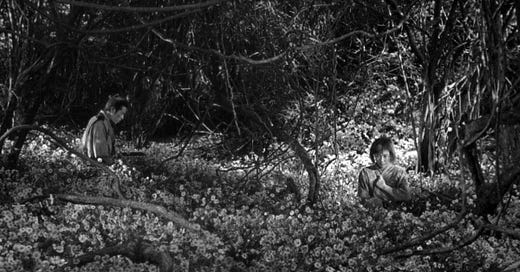100 Movies Every Catholic Should See #107: Seven Samurai (1954)
Directed by Akira Kurosawa
I may go as far to claim that Seven Samurai is the most influential international film ever made. This film is one of the most highly acclaimed films in the history of cinema: consistently making it to the top of every list of the greatest films ever made. But what makes this film so special, and what can we hope to gain from watching it?
Seven Samurai is akin to something like The Lord of the Rings: a long epic with tons of fleshed-out characters: as stated in our introduction, Kurosawa was the master of humanist stories, using (most of the time) the setting of Feudal Japan to tell us universal stories about the human condition. Kurosawa can paint pictures using some of the greatest cinematography to display a story so well paced that it feels half its actual massive runtime. Seven Samurai never feels overwhelming and has served as a blueprint for longer epics since its release, and inspired numerous spin-offs across genres. Everything from Westerns like The Magnificent Seven to A Bug’s Life to Star Wars: The Clone Wars episodes has had some inspiration from Seven Samurai. The basic premise of poor farmers or gatherers fed up with being taken advantage of by criminals and investing in a ragtag group to defend themselves has been told many a time, but is almost always related back to Kurosawa’s masterpiece.
Every character feels fleshed out and like they could be a real person, with excellent performances from all to sell them to the audience. Toshiro Mifune’s especially enigmatic “poser” samurai character may be one of the best ever put to film, offering a vulnerable and fragile look into the male archetype he is so frequently remembered for. Seeing the character evolve and grow along with the others in spite of his flaws is nothing short of beautiful to watch, and can serve as an example to all of us. Shimura gives us a main protagonist who leads as many should, and serves as a benchmark for other fictional leaders and how they should be written. Every side character further shows us parts of ourselves that some may not be as willing to examine, such as how we can indeed be selfish and negligent of the needs of others, but calls out to us to change our ways.
In terms of technical aspects, Seven Samurai is nothing short of excellence. Well-renowned for its cinematography, the film displays a wonderful blend of static and dynamic shots that bring the viewer into the world so carefully given life by Kurosawa. The black-and-white film stock and subtitles should not be a turn-off for anyone, even if they aren’t normally your thing. Within 15 minutes, you will forget you’re watching a subtitled film and be fully engrossed. The music itself is well worth the listen, drifting more towards a classical blend rather than the typical Eastern scores of the time period (not meant to be a jab or to demean Eastern scores, but to emphasize the differentiation of Seven Samurai from other films of the time). Kurosawa’s excellent editing gives way to a vision that is not romanticized violence, but a realistic and somewhat bleak view of the cost of violence. That no one leaves a fight unscathed, and that one should consider the cost of violent conflict and its long-term consequences.
The historical impact of Seven Samurai cannot be understated. Released in 1954, it received universal positive reviews and was an immediate success. At the time, it was the most expensive movie ever made in Japan, and it quickly became the highest-grossing film in Japanese history at the time. Seven Samurai established a new standard in Japanese cinema, and was a shot heard around the world for cinema. It has since been claimed that Seven Samurai is one of the most “remade, reworked, and referenced” films of all time (Richie, 1998). Since its release, its impact on the Western was felt almost immediately, with the excellent John Sturges giving us the iconic The Magnificent Seven, even if Kurosawa didn’t (understandably) care for it. Multiple Star Wars episodes of The Mandalorian, The Clone Wars, and even the original Star Wars owe their existence to this essential Japanese classic.
It is in Seven Samurai’s astounding quality and universality that it has impacted generations of filmmakers: the film does not continue to “subvert society” and further degrade us like most modern media does, but it meets us in our brokenness and inspires us to be better. It shows that in a hopeless world, there can be hope, and through unity and sacrifice, even the most unstoppable of evils can be braved. It is a selfless story of a selfish people, and you will be all the better for having seen one of the greatest films of all time.






